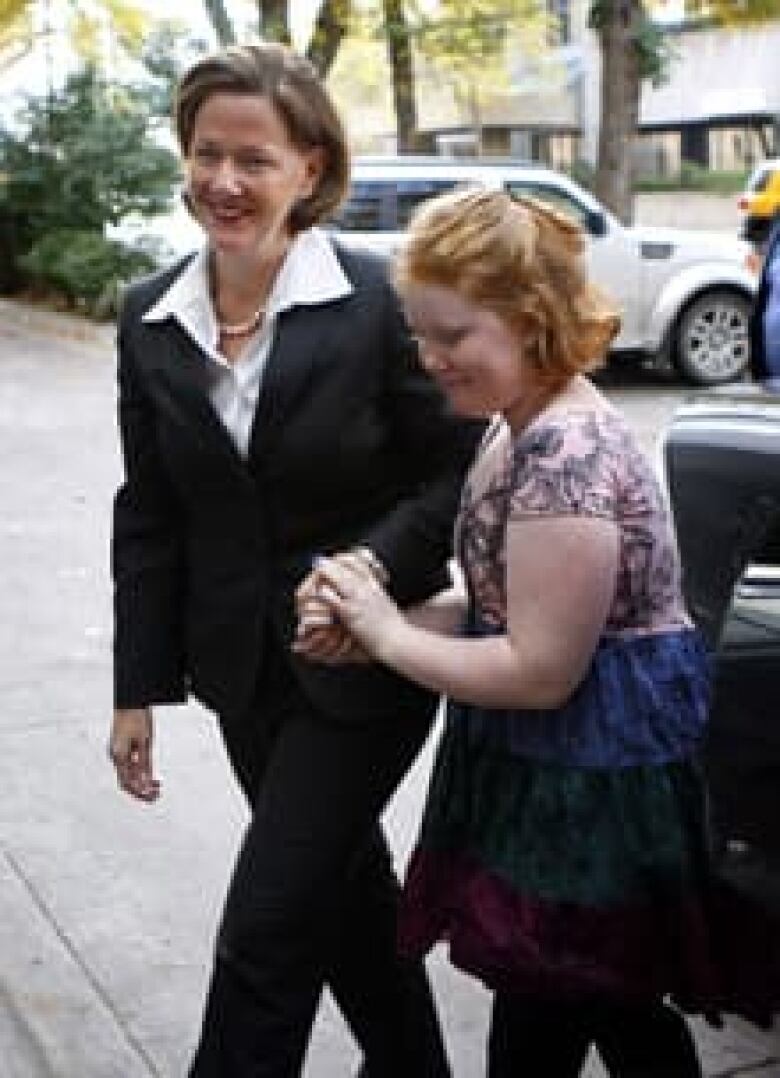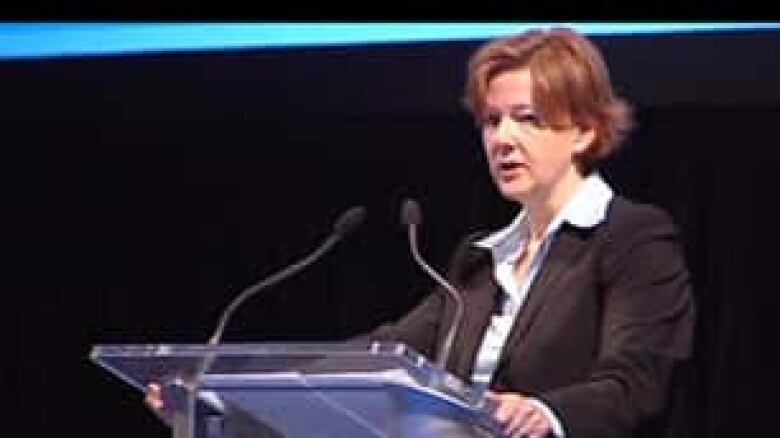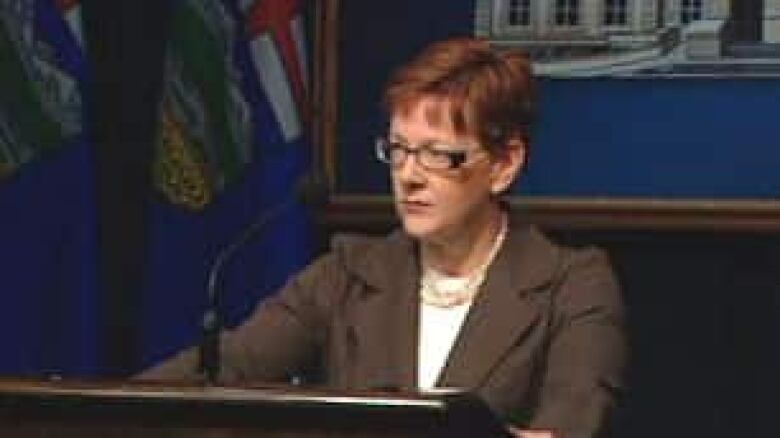PROFILE: Alison Redford, Alberta premier
Sworn in as Alberta's 14th premier on Oct. 7
"Today Alberta voted for change," Alison Redford said near the beginning of her victory speechOct. 2in Edmonton. The Progressive Conservative Party of Alberta had just elected her as their leader and therefore, the premier-designate of Alberta.
Change was a word used frequently by Redford in her victory speech and during her successful leadership campaign especially when she talked about what direction the party should take. "Make no mistake, we are going to do things differently," she proclaimed in her speech.
Even though the 46-year-old Calgary MLA was a cabinet minister in Ed Stelmach's government, Redford took positions throughout the campaign that aren't in line with party policy.
She was sworn in as Alberta's 14th premier on Oct. 7.
A lawyer by profession and a life-long conservative, Redford is relatively new to the Alberta political scene. She was elected the MLA for Calgary-Elbow in March 2008 and Stelmach immediately appointed her justice minister and attorney-general.
She resigned from those positions in February after joining the race to replace Stelmach as party leader and premier. Redford says that her time in government convinced her that the party needed to change.
"What makes change is when I could go to my cabinet colleagues and say 'You know, I just talked to a community leader and we have a fantastic idea about something that we can do differently,'" she recounts.
The response from her colleagues, she says, was "'Oh, we don't do things that way. That's not the way we've done them before.' It was incredibly frustrating."

However, given her short time in cabinet, Redford was not viewed as near the lead until just before the first ballot on Sept. 17, when a poll showed her in second place. "Nobody thought I was going to be in second place," she said at the time.
Redford did finish in second place on the first ballot with 19 per cent of the vote, enough to earn her place on the Oct. 1 second ballot, with the other top-three finishers, Gary Mar and Doug Horner. All three eliminated contestants in the race threw their support to Mar.
Redford gets the momentum
However, the campaign managers for two of the candidates issued harsh rebukes over their candidates backing Mar and instead supported Redford.
Although she was well behind Mar, a Klein-era cabinet minister who won 41 per cent of the vote, Redford now had the momentum.
Alison Redford's family:
Mother: Helen (died Sept. 27).
Father: Merrill.
Sisters: Lynn, Melody.
Husband: Glen Jermyn, a lawyer.
Daughter: Sarah.
Redford was dealt a blow in the final days of her campaign when her mother, Helen Redford, died Tuesday night after an existing medical condition suddenly took a turn for the worse.
Her campaign strategist, Stephen Carter, said, "She feels very strongly that she wants to campaign for this leadership now more than ever. Her mother was proud of her and proud of what she was doing. And that's a powerful, powerful feeling when you're heading into the final days of the campaign."
It was her mother who got Redford involved in politics 30 years before.
Redford took part in a televised leadership debate with Horner and Mar the next night. She won praise for a polished performance under trying circumstances.
Voter turnout was low, just over half the number of voters on the second ballot in the 2006 leadership race. Redford was still in second but Mar did not get a majority and so the second choice of the Horner voters was then added to the totals of the two frontrunners.
Only about two-thirds of Horner's supporters marked a second-choice but almost 80 per cent of them selected Redford, giving her a narrow victory over Mar.
Young Conservative in high school
Redford was born in 1965 in Kitimat, B.C. but her family's roots in Alberta run deep. Her grandparents, Scotty and Robina Anderson, were a founding family in Redwater, a town about 50 kilometres northeast of Edmonton.
The Andersons owned the town store and were also deans of the local United Church. Redford spent several years in Redwater as a child and the experience left an impression on her.
" I always have a very strong memory of being part of a family that had leadership in a community, that helped build community."

By the time Alison was 12, the family was back in Calgary.
When she was still in high school (Bishop Carroll in Calgary), Redford was elected the president of the Progressive Conservative Youth of Alberta.
"It always was a job that went to university kids but not with Alison in the room," said Jim Hawkes, a PC MP in Calgary from 1979 to 1993.
Hawkes remembers the teenaged Redford as a reliable campaign worker who was focused on winning.
That was only a short time before Stephen Harper became Hawkes' executive assistant. In another few years Harper was running against his former mentor, then defeating him in the 1993 general election, running on the Reform Party ticket.
From there, Redford went to university, receiving her law degree from the University of Saskatchewan in 1988.
On to Ottawa, then the world
Next stop was Ottawa, where was a policy advisor to Joe Clark, then Minister of External Affairs.
She moved on to a job in Prime Minister Brian Mulroney's office, before beginning a career in international work, in places like South Africa, Vietnam, the Philippines, Bosnia and Afghanistan.
Redford believes her experience makes for an uncommon political resume.
"My examples are pretty unique," she said.
"My examples are sitting in Helmand province in Afghanistan with the governor with ten machine guns around me trying to figure out how we were going to get people voter education."
Seeks political office
Her first run for political office was at the federal level. In 2004 she ran against Calgary West MP Rob Anders for the Conservative nomination but lost.
Anders said during the race that he was confident of victory, "unless shes got some magic support base of people who like feminist lawyers."
Anders said he won't be voting PC in the next federal election but will back the Wildrose Party.

Redford believes that having a leader with a wide variety of experiences is an asset that should be respected, but she feels they aren't valued by the Tory caucus.
"It's no secret that when I decided to run, no one in cabinet supported me and one MLA supported me and there's lots of conclusions you can draw from that," she said.
"But I think fundamentally the conclusion was it's too much change and that's disappointing for me."
Former Calgary MP Jim Hawkes hopes that Redford's qualities become better known.
"She's a real believer in the people side of politics and the help that people need, but she's a conservative and a very deeply-held conservative who's basically believes you have to have the money. You've got to be sensible, if you're going to be helpful," he said.
Redford's politics
Despite all her talk of change during the campaign, the word does not appear in the transcript of Redford's first post-election press conference.
And even though she had almost no support from her cabinet colleagues she apparently enjoyed support from the 'old guard' of the party.
Daryl Fridhandler worked on Gary Mar's campaign but Redford was a strong second choice for him, and he had worked with her in his role as vice-chairman of the police commission in Calgary.
"When I started calling some of the people that I thought were some of the old guard on the financial side of the party, they were all with Alison," Fridhandler told CBC News.
It's unclear where precisely to put Redford on the political spectrum. In the 1997 federal election she worked on the PC campaign, not the Reform Party's.

Fridhandler, who supports the Liberals federally, said Redford is "perceived as being left of centre."
Based on her campaign, Redford is expected to continue the tough-on-criminals policies she followed as justice minister. During the campaign she was seen as the staunchest defender of public health care.
When she was in South Africa she worked with Nelson Mandela, then the leader of the African National Congress. Mandela became the country's first black president in the 1994 elections, which Redford helped coordinate.
Redford's campaign strategy
Redford's leadership campaign followed the grassroots strategy of Naheed Nenshi who won a surprise victory in 2010 to become Calgary's mayor. Carter, her campaign manager, also ran Nenshi's campaign.
Redford looked for support outside as well as inside the party.
It was a campaign based on change but Redford's look also changed. Here's how the Canadian Press's Dean Bennett describes it: " Her thick librarian glasses were tossed out and the pulled back hair was let down over her shoulders. Buttoned-up shirts were replaced with wide, open collars."
For Redford herself, her surprising come-from-behind victory and her becoming the first woman to serve as Alberta premier, means that "our politics caught up with who we are and I hope that is how Canadians will see this."
Corrections
- The name of Alison Redford's grandmother is Robina, not Albina, Anderson. The Andersons were also incorrectly identified in a photograph which has since been removed that appeared in an earlier version of this story.Oct 02, 2011 3:45 AM MT
With files from the CBC's John Archer and The Canadian Press












_(720p).jpg)


 OFFICIAL HD MUSIC VIDEO.jpg)
.jpg)



























































































